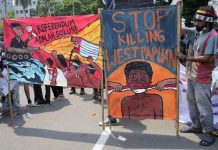The PALM Ministerial Interim Meeting (MIM) for PALM10 was held in Suva, Fiji, on 12 February 2024 in order to follow up on the outcomes of the Ninth Pacific Islands Leaders Meeting (PALM9) as well as to prepare for PALM10. This was the first time for MIM to be held in the Pacific Islands Region.
2. The Meeting was attended by representatives from Japan and the Pacific Islands Forum (PIF) Members. The Meeting was co-chaired by Kamikawa Yoko, Minister for Foreign Affairs of Japan and Tingika Elikana, Minister for Foreign Affairs, Marine Resources and Parliamentary Services of Cook Islands, current Chair of the PIF.
3. The Meeting was held at a critically important moment when countries continue to recover from the socio-economic impacts of the COVID-19 pandemic and continue to address the existential threat of climate change. Upholding the international rules-based order, where international law including the Charter of the United Nations (UN) and fundamental norms, rules and principles of the international community are respected, is becoming more important now than ever for global peace and stability, reaffirming the importance of unity and solidarity on matters of global interest.
4. The Ministers reaffirmed the significant role the PALM process has played for over a quarter of a century in enhancing genuine partnership and their determination to further strengthen it to better address the evolving opportunities and challenges of the region. Recalling the Ninth Pacific Islands Leaders Meeting Leaders Declaration (“PALM9 Leaders Declaration”), the Ministers affirmed their strong commitment to the friendly and cooperative relations between Japan and the PIF Members, an important partnership underpinned by mutual trust and respect, as well as the 2050 Strategy for the Blue Pacific Continent (2050 Strategy).
5. In line with the international rules-based order, Ministers committed to working together in genuine partnerships, rooted in mutual respect, consistent with the principles of the UN Charter, and in the spirit of transparency and accountability, recognising that the rights, freedoms and sovereignty of all countries, regardless of size or power, are protected by international law, rules and norms. This included shared universal values such as freedom, democracy, sustainable development, the rule of law, human rights, human dignity, the peaceful resolution of disputes, and respect for environmental integrity. Minister Kamikawa explained such shared universal values form the basis of Japan’s effort to realise a free and open international order in the region in accordance with international law and the UN Charter.
6. Minister Kamikawa emphasised Japan’s long-standing commitment to support the Pacific Region’s vision, priorities and regionalism in accordance with the 2050 Strategy and the 2050 Strategy Implementation Plan (2050 IP). The PIF Ministers expressed their appreciation for Japan’s enduring support for a resilient Pacific Region of peace, harmony, security, social inclusion and prosperity, that ensures all Pacific peoples can lead free, healthy and productive lives.
7. The Ministers acknowledged the PIF as the apex of the Pacific regional architecture and the driver of regional priority setting and resource allocation, and fully supported the Blue Pacific Principles for Dialogue and Engagement and regional unity. The Ministers intend to continue working through established mechanisms within the Pacific regional architecture.
8. Minister Kamikawa highlighted Japan’s renewed commitment to the Pacific Region through its “All Japan” efforts under Japan’s Pacific Bond (KIZUNA) Policy announced in PALM9 and prioritising transparent and inclusive partnership. The PIF Ministers shared the importance of the free and open international rules-based order in accordance with international law and the UN Charter and welcomed Japan’s commitments and concrete actions to further strengthen cooperation with the PIF Members.
9. Regarding the discharge of ALPS treated water into the Pacific Ocean, Minister Kamikawa explained the Japanese Government’s position that the discharge has been carried out in accordance with relevant international safety standards and practices, and committed to continue working closely with the International Atomic Energy Agency (IAEA). Minister Kamikawa also expressed her appreciation for the science-based discussions that Pacific Island Countries have been engaging in with Japan and the IAEA. The Ministers recognised the IAEA as the authority on nuclear safety, noted the IAEA Comprehensive Report issued on 4 July 2023 and concurred on the importance of being based on scientific evidence in this matter. PIF Ministers welcomed the intensive dialogue with Japan and recalled the Communique of the 52nd Pacific Islands Forum Leaders, inter alia the importance of the South Pacific Nuclear Free Zone Treaty (Rarotonga Treaty). The Ministers concurred on maintaining the ALPS issue as a standing agenda item for PALM, supported by an ongoing dialogue process.
Follow-up of PALM9
10. Minister Kamikawa provided an update on the implementation of Japan’s PALM9 commitments as well as related development assistance and cooperation projects. Since PALM9, Japan has continued to implement its robust and sustainable development assistance, and supported human resource development and people-to-people exchanges for approximately 6,500 people, exceeding Japan’s PALM9 commitments (5,500 people). This cooperation continues to support progress towards the achievement of the PIF Leaders 2050 Vision.
11. The Ministers concurred on continuing cooperation to address issues related to their shared past including repatriation of the remains of war dead from World War II, the urgent clearance of unexploded ordnance, and maintenance of government-built monuments for the war dead as appropriate to maintain friendly bonds and to build future-oriented relations.
12. Minister Kamikawa explained Japan’s cooperation projects to the PIF Members on the Areas of Cooperation concurred in PALM9, as provided in the Attachment. The Ministers acknowledged the work undertaken in:
a) Priority Area 1 – COVID-19 Response and Recovery: reaffirming the importance of regional and multilateral collaboration to build back better and address ongoing health challenges and allaying social and economic impacts;
b) Priority Area 2 – Sustainable Oceans Based on the Rule of Law: on regional cooperation to support Leaders commitment to the importance of free, open and sustainable maritime order based on the rule of law and in accordance with international law and the UN Charter;
c) Priority Area 3 – Climate Change and Disaster Resilience: recognising the need to address climate change, including through related key Pacific initiatives like the Pacific Resilience Facility, with a sense of urgency and commitment;
d) Priority Area 4 – Strengthening Foundation for Sustainable and Resilient Economic Development: reaffirming their continued cooperation in developing quality infrastructure in line with international standards, including the Pacific Quality Infrastructure Principles; and
e) Priority Area 5 – People to People Exchanges and Human Resource Development: reaffirming the importance of strong personal bonds through active people-to-people exchanges, in particular among the youth.
13. The PIF Ministers expressed appreciation for Japan’s smooth and steady implementation and welcomed Japan’s long-standing record of consistent implementation of its commitments. The PIF Ministers welcomed the commitment by Japan to work bilaterally and in partnership with the PIF to develop and refine Japanese development assistance, cooperation projects and initiatives in alignment with the 2050 Strategy and the 2050 IP. The Ministers concurred that the priority areas of cooperation for PALM10 will be framed according to Japan’s vision for its partnership with the Pacific region in alignment with the 2050 Strategy and the 2050 IP.
Cooperation in International Fora
14. The Ministers reaffirmed their appreciation for the continued cooperation between Japan and the PIF Members on initiatives and efforts at the multilateral level and in international fora.
15. The Ministers discussed the broad regional security issues affecting the region since PALM9 and concurred on the importance of enhanced cooperation in maintaining and strengthening global peace and stability.
16. The Ministers opposed any war of aggression and committed to seeking a permanent and sustainable peace consistent with the purposes and principles of the international law including the UN Charter. They expressed strong opposition to any unilateral attempts to change the status quo by force or coercion anywhere in the world.
17. Recalling the UN General Assembly Resolution 70/1 of 25 September 2015, entitled “Transforming our world: the 2030 Agenda for Sustainable Development”, in which it adopted a comprehensive, far-reaching and people-centered set of universal and transformative Sustainable Development Goals and targets, the Ministers reaffirmed their commitment to advancing gender equality and social inclusion as well as the Women, Peace, and Security (WPS) agenda, including in alignment with the Revitalised Pacific Leaders Gender Equality Declaration (PLGED).
18. The Ministers expressed their commitment to achieving a world without nuclear weapons. The Ministers reaffirmed the importance of nuclear disarmament and non-proliferation efforts to create a more stable and safer world and of the Treaty on the Non-Proliferation of Nuclear Weapons (NPT) as the cornerstone of the global nuclear non-proliferation and nuclear disarmament regime and the pursuit of peaceful uses of nuclear energy, alongside a wide range of treaties and arms control agreements that contribute to this aim.
19. The Ministers stressed the importance of efforts to achieve Democratic People’s Republic of Korea (DPRK)’s complete, verifiable, and irreversible dismantlement of all weapons of mass destruction and ballistic missiles of all ranges in accordance with UN Security Council (UNSC) resolutions as expressed in the PALM9 Leaders Declaration and called on DPRK to take concrete actions toward that goal. They expressed their grave concern over the surge in DPRK’s launches using ballistic missile technology, which undermines regional peace and security. They called on DPRK to accept repeated offers of dialogue, including from Japan, the United States and the Republic of Korea. The Ministers condemned DPRK’s malicious cyber activities that fund its unlawful weapons of mass destruction and ballistic missile programmes. The Ministers reaffirmed their commitment to fully implementing and enforcing the UNSC resolutions, including addressing the DPRK’s sanctions evading tactics such as “ship-to-ship transfers.” The Ministers emphasised the continued importance of addressing humanitarian concerns, including the immediate resolution of the abductions issue.
20. The Ministers stressed the importance of an early reform of the UNSC, including expanding permanent and non-permanent categories of its membership, reaffirming the need to further enhance the legitimacy, effectiveness and representativeness of the UNSC to better reflect the realities and challenges of the international community in the twenty first century. The Ministers reaffirmed the importance of an expanded, democratic, equitable, transparent and accountable UNSC.
Towards PALM10
21. The Ministers discussed further cooperation between Japan and the PIF Members towards PALM10 for the Pacific Islands Region’s priorities in accordance with the 2050 Strategy. Minister Kamikawa appreciated ideas expressed by the PIF Members about their priorities and needs. The Ministers also welcomed cooperation with all partners, in the region and beyond, sharing the objectives based on the region’s priorities.
22. The PIF Ministers highlighted the importance of working in close partnership to ensure PALM10 strengthens collective efforts in responding to regional and global development challenges including: climate change and disasters; ocean and environment; resources and economic development; technology and connectivity; and people-centered development. The Ministers jointly discussed their visions and priorities for PALM10, thereby laying the groundwork for PALM10.
23. Minister Kamikawa explained that the PALM10 will be held in Tokyo in July 2024. The PIF Ministers welcomed Japan’s hosting of PALM10. The Ministers shared their determination to continue close consultation in preparation for a successful PALM10.
SOURCE: PIFS/PACNEWS

















